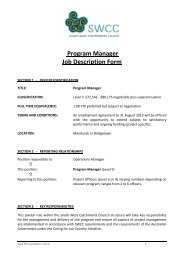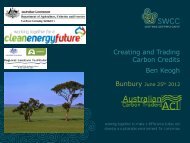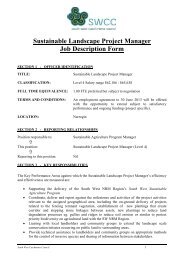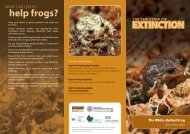Tender for the Programme - South West Catchments Council
Tender for the Programme - South West Catchments Council
Tender for the Programme - South West Catchments Council
You also want an ePaper? Increase the reach of your titles
YUMPU automatically turns print PDFs into web optimized ePapers that Google loves.
DRAFT<br />
<strong>South</strong> <strong>West</strong> Regional NRM Strategy – Ancillary Document<br />
The objectification of <strong>the</strong> natural world began during <strong>the</strong> Age of Enlightenment about 300 years ago.<br />
People saw <strong>the</strong> world and <strong>the</strong>ir place in it in very different ways be<strong>for</strong>e that, said Robinson.<br />
Today, he said, sustainability will not be achieved without "engaging people in numbers and at levels that<br />
have never been done be<strong>for</strong>e".<br />
New social media tools like Facebook may help with such a monumental task, as "people certainly don't<br />
like to come to public meetings".<br />
Current approaches to help <strong>the</strong> public understand <strong>the</strong> implications of climate change, such as graphs or<br />
iconic pictures of polar bears, have limitations and are ineffective, said Mike Hulme, a climate scientist at<br />
<strong>the</strong> University of East Anglia in <strong>the</strong> UK.<br />
"We need to find new ways to think about <strong>the</strong> future under climate change," said Hulme.<br />
Art could be one such approach, suggested Dietz. It would serve not as propaganda but as a creative way<br />
to engage our imaginations. "Art can provoke thinking and actually change people's perceptions of <strong>the</strong><br />
complex issues associated with sustainability science," he argued.<br />
"When we're considering questions about preserving biodiversity versus creating jobs, art can help us<br />
examine our values and have a discussion that's broader than just scientific facts."<br />
It is tempting to believe <strong>the</strong> arts can help by softening and 'pretty-fying' <strong>the</strong> message and bringing it to a<br />
wider audience, said award-winning photographer Joe Zammit-Lucia.<br />
"We need to go much fur<strong>the</strong>r to provide a different worldview that can help us re-frame <strong>the</strong> issues," said<br />
Zammit-Lucia.<br />
Society's choices are driven by people's cultural perceptions of reality, which in turn are based on <strong>the</strong>ir<br />
values and <strong>the</strong>ir cultural context, he said. While helpful, scientific knowledge and experts are also part of<br />
<strong>the</strong> problem: by dominating <strong>the</strong> sustainability discourse, <strong>the</strong>y narrow people's visions of what's possible.<br />
"I also don't buy in <strong>the</strong> idea we need to make <strong>the</strong> right decisions. What we need is <strong>the</strong> right process, ways<br />
in which <strong>the</strong> public can fully participate," he concluded.<br />
http://www.ipsnews.net/news.aspidnews=106808 21-2-2012<br />
7.7 Land use change and development<br />
The speed of land use change and development in <strong>the</strong> <strong>South</strong> <strong>West</strong> NRM region has accelerated over <strong>the</strong><br />
last decade or so, partly due to <strong>the</strong> ever-increasing numbers of mining employees on FIFO (fly in-fly out)<br />
contracts that now call <strong>the</strong> south west “home”. This naturally puts <strong>the</strong> environment under increasing<br />
pressure and demands ever more rapid responses from <strong>the</strong> NRM community, just to maintain <strong>the</strong> status<br />
quo <strong>for</strong> our most valued NRM assets.<br />
Of particular importance is <strong>the</strong> fact that many of <strong>the</strong> community engagement strategies employed in <strong>the</strong><br />
past may not be as effective as be<strong>for</strong>e, as FIFO employees don’t have <strong>the</strong> same “connection with <strong>the</strong><br />
land” as do people who have lived <strong>for</strong> generations in <strong>the</strong> same area, or at least have moved to an area<br />
with <strong>the</strong> aim of staying <strong>the</strong>re in <strong>the</strong> long term. SWCC and its partners will have to deal with this issue, as<br />
will all o<strong>the</strong>r sectors (ranging from health to policing and social welfare).<br />
7.8 Decreasing resilience in <strong>the</strong> community<br />
Resilience is generally said to mean <strong>the</strong> time it takes <strong>for</strong> an individual, community or organization to<br />
recover/rebound from a crisis or disturbance, such as a drought or freak storm, and not effectively resolve<br />
it but also learn from it, be streng<strong>the</strong>ned and emerge trans<strong>for</strong>med by <strong>the</strong> experience. That said, it is a<br />
more “diffuse” issue that is a little difficult to “pin down”, also being closely related to some of <strong>the</strong> o<strong>the</strong>r<br />
issues, such as globalisation and FIFO contracts, as well as with consumerism and <strong>the</strong> general decrease<br />
in personal responsibility and empathy across communities.<br />
213






